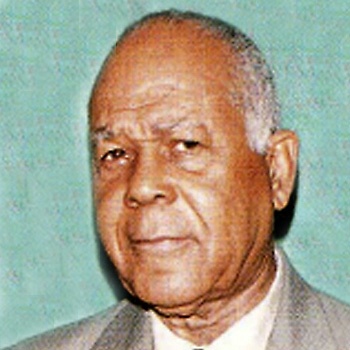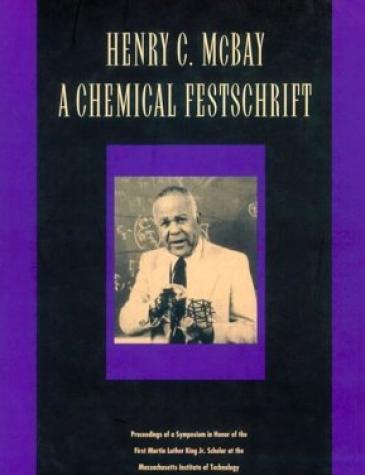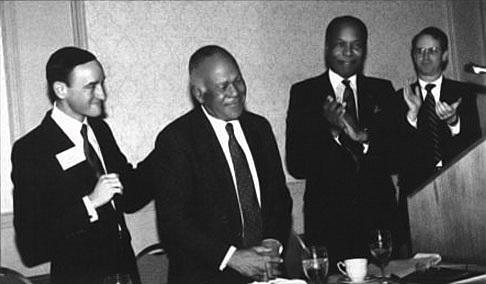Dr. Henry Ransom Cecil McBay
Dr. Henry Ransom Cecil McBay
Distinguished Professor of Chemistry, Morehouse College
Visiting Scholar 1990-1991
The Institute’s first MLK Visiting Scholar, hosted by the Chemistry Department

Bio
McBay was born to hardworking parents in Mexia, Texas. He studied at Wiley College, where he "fell madly in love with [organic] chemistry...the most beautiful thing in the world." By age 20, he graduated cum laude with a Bachelor of Science, second in the Class of '34.
Atlanta University, the nation's oldest black graduate institution, had an unofficial policy of granting scholarships to the two top graduates of black colleges. This afforded McBay “meat and bread for the next nine months.” McBay studied new types of plastics and earned his Master of Science in 1936.
He returned to Texas to help pay for his siblings' college degrees, serving as an Instructor of Chemistry at Wiley College. For the next decade, without the wherewithal for doctoral work, he shared a janitor job with his brother, took courses at the University of Chicago, and taught at various schools.
He also worked with a research team at Tuskegee Institute led by George Washington Carver. The research funder was a sugar refining company interested in an alternative to the jute fiber (used for rope and burlap sacks). Imported from India, jute fiber was scarce during World War I, and the Carver team was researching okra stems as a plausible substitute. McBay's work ultimately proved that it is impossible to harvest okra both for food and for fiber-- essentially ending his fellowship in 1942. “I had researched myself out of a job,” he said.
Doctorate
The events at Pearl Harbor made McBay a priority draft. He enrolled as a doctoral student in the University of Chicago to defer the draft. While McBay was the only black student in his graduate class, a number of black PhDs in chemistry preceded him-- among them MIT alums Marron William Fort ’33, William Jacob Knox, Jr. ’35, and Henry Hill ’42.
McBay’s dissertation topic, “Reactions of Atoms and Free Radicals in Solution," came by chance. Organic chemist Prof. Morris Kharasch assigned him to synthesize commercially unavailable compounds using acetyl peroxide. “I did not know it at the time, but nobody would work on acetyl peroxide because it is a very dangerous explosive...Either I did that project or I went to the army. At this point, they were shooting people in Belgium [Battle of the Bulge].”
McBay was the first in history to handle such large quantities of acetyl peroxide, which “got to be very hot in organic chemistry at the time". Many colleagues in the field who were interested in this "state-of-the-art modern organic chemistry,” however, avoided contact on learning that McBay was black (further illustrated by the lower rate of citations in American vs. European journals later in his career). One application of his doctoral research led to the development of a treatment for prostate cancer. He won the the Elizabeth Norton Prize for Excellence at Research in Chemistry in 1944 and in 1945, the year he earned his PhD in Chemistry.
Career
In 1945, Dr. McBay joined the teaching faculty at Morehouse College, where he would teach for the next 36 years. His dedication to teaching and mentorship was legendary: nicknamed The Little Giant for his rigorous academic standards, Dr. McBay continued to teach chemistry until his death in 1995. He taught 'miracles': one of his favorite lecture demonstrations was making table salt by combining two poisons (sodium and chlorine).
Over 50 chemistry majors under his tutelage went on to earn doctoral and medical degrees. At least two came to hold degrees from MIT: Charles Hubert Smith, ScD '82 and James Williams Mack, PhD '84. Shirley [Mathis] McBay, in particular, earned two Masters (chemistry and mathematics) from Atlanta University in 1957 and 1958, a PhD in Mathematics from University of Georgia in 1966, and she became Dean for Student Affairs at MIT in 1980; they were also married for a time and had two sons.
Dr. McBay's teaching also crossed international borders. In 1951, he developed a chemistry education program for Liberia as part of a UNESCO mission.
By his retirement in 1981 Dr. McBay had served as Chairman of the Department of Chemistry at Morehouse for a quarter century. Morehouse established an endowed scholarship in his name and named him a Distinguished Professor. In 1988, he became professor emeritus of chemistry and co-director of the Program for Research Integration and Support for Matriculation (PRISM) to the Doctorate at Clark Atlanta University, and in 1995 the United Negro College Fund established a fellowship in his name.
Former MIT Provost Mark S. Wrighton praised Dr. McBay for being “one of the nation’s leading educators of African Americans” and playing a crucial role “for more than 40 years as an undergraduate teacher in inspiring, helping, and driving 43 Morehouse students to go on to get PhDs in chemistry.”
At MIT
In 1990, an MLK Planning Committee at MIT selected Dr. McBay as the Institute's first MLK Visiting Scholar. A four-day gala symposium was held in his honor that included a presentation of Dr. McBay's biography and a chronology of African Americans in chemistry by History of Science professor at MIT Kenneth R. Manning. There was a panel by three scientists, among them William Knox, Jr., MIT's first black PhD in chemistry. Dr. McBay also visited the local high school, Cambridge Rindge and Latin, where he spoke to students enrolled in the Massachusetts Pre-Engineering Program (MASSPEP, a program designed to encourage minority students to pursue STEM fields). The celebrations concluded with a banquet that featured one of Dr. McBay's freshman chemistry students, then U.S. Secretary of Health and Human Services Dr. Louis Sullivan.
 Former MIT Provost Mark S. Wrighton praised Dr. McBay for being “one of the nation’s leading educators of African Americans” and playing a crucial role “for more than 40 years as an undergraduate teacher in inspiring, helping, and driving 43 Morehouse students to go on to get PhDs in chemistry.”
Former MIT Provost Mark S. Wrighton praised Dr. McBay for being “one of the nation’s leading educators of African Americans” and playing a crucial role “for more than 40 years as an undergraduate teacher in inspiring, helping, and driving 43 Morehouse students to go on to get PhDs in chemistry.”
Henry C. McBay: A Chemical Festschrift (MIT Press, 1994) documents the proceedings of a symposium in his honor as the Institute's first MLK Scholar. The volume opens with a biographical chapter by science historian and MIT professor Kenneth R. Manning. Appendices include a list of Dr. McBay's publications and of chemistry majors under him who went on to earn doctoral and medical degrees.

MLK Banquet, December 1990. Left to right: MIT Provost Mark S. Wrighton, Dr. McBay, US Secretary of Human Services Louis Sullivan, and MIT President Charles M. Vest

Lecture and book signing after a ceremony celebrating Martin Luther King, Jr. Day and the inauguration of the MLK Visiting Professors Program, an extension of the Visiting Scholars Program. 18 January 18, 1995.